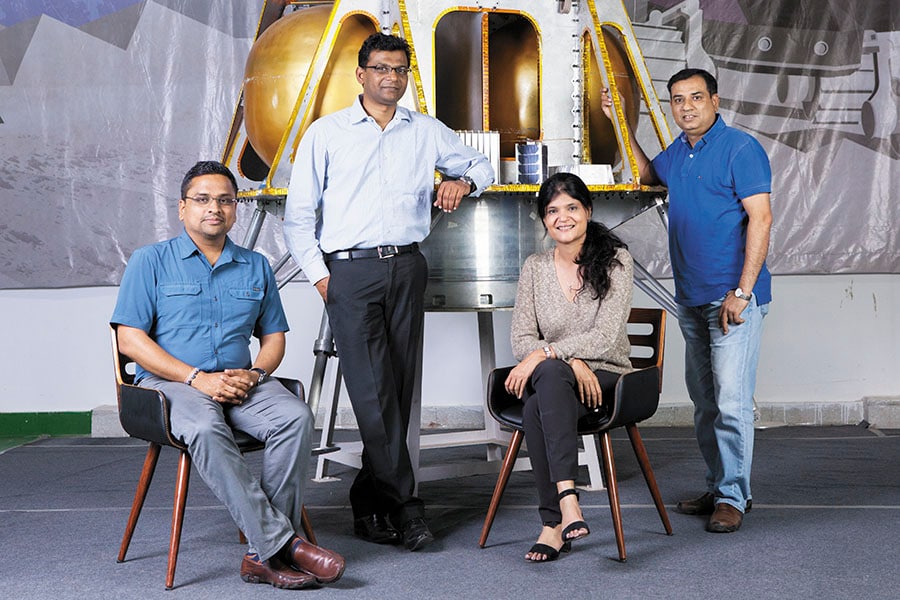Celebrating TeamIndus for dreaming big
India's first private effort to land a rover on the moon seems to have gone awry, but here's why it is no cause for disappointment


 Reaching for the moon: TeamIndus members (from left) Sridhar Ramasubban, Rahul Narayan, Sheelika Ravishankar and Dhruv Batra
Reaching for the moon: TeamIndus members (from left) Sridhar Ramasubban, Rahul Narayan, Sheelika Ravishankar and Dhruv Batra
Image: Nishant Ratnakar
“Falcon heavy goes vertical,” billionaire entrepreneur Elon Musk recently tweeted, with a short time-lapse video. The rocket, built by Musk’s company SpaceX, will soon go on its first test flight, and, if all goes well, it could be the rocket that takes humans to Mars, one day.
Such dreams are possibly what propel the founders behind the 10 space startups in India—there are more than 1,500 globally—to one day build an Indian SpaceX or Blue Origin that can join the Indian Space Research Organisation (Isro) in taking India’s space leadership into the next millennium.
For now, Isro, which launched its 100th satellite on January 12, remains the only game in town. Stellar though its role has been thus far, Isro has a very different approach in comparison to Nasa that has struck deals with many private enterprises.
Therefore, what’s a little lost in the disappointment over TeamIndus reportedly pulling out of the Google-backed Lunar XPrize contest is that they did come quite far. Especially for an Indian startup that dreamed of delivering full programmes—building and launching a satellite, and not supply piecemeal components to ISRO.
TeamIndus actually made it to the final 10—from among 29 contestants—then remained in the final five, and won one of the milestone prizes, leading up to the actual launch date. The competition required contestants to build, launch and land a rover on the moon, for it to then cover 500 m on its own power and send back pre-designated data.
And the effort had to be privately funded. Indeed, chief among TeamIndus’s reasons for pulling out seems to be their inability to raise money to pay ISRO for the PSLV rocket they would need, according to a report in The Ken.
[qt]The story of TeamIndus is a call for getting things fixed at many levels in India.”[/qt]
—Narayan Prasad, founder, Satsearch
TeamIndus, or Axiom Research Labs, the company behind the project, had estimated it would need about ₹450 crore, but it reportedly managed to raise only half the amount. Axiom Research Labs was started by IIT Delhi alumnus Rahul Narayan, who, in 2010, was the last to register for the Lunar XPrize, three years after it was announced.
Narayan (44), through an external PR agency, declined to comment, in response to a Forbes India email. He was inspired by the Ansari Prize, in 2004, he had said in an interview to Forbes India last June, to give up his software career and take the plunge to start Axiom Research.
“The story of TeamIndus is a call for getting things fixed at many levels in India,” wrote Narayan Prasad, co-founder of Dhruva, a private Indian space startup that is trying to build its own satellites, in an email from Berlin. Prasad now has a new company in Berlin called Satsearch, registered in the Netherlands, which has an agreement with ISRO’s commercial unit, Antrix Corporation, to sell Indian space hardware overseas.
There needs to be a strategy to scale up space startups in India, with money from venture capital and private equity firms, as well as multinational aerospace companies, Prasad argues. Airbus Ventures funding Japan’s InfoStellar, is a good example, he writes. India’s space effort could yield a $10 billion economy by 2025, creating more than 1 lakh jobs, he adds.
Such brave new collaborations augur well for India’s space future, but they need more backing. Hopefully, TeamIndus will find it, and keep going.
First Published: Jan 22, 2018, 06:39
Subscribe Now